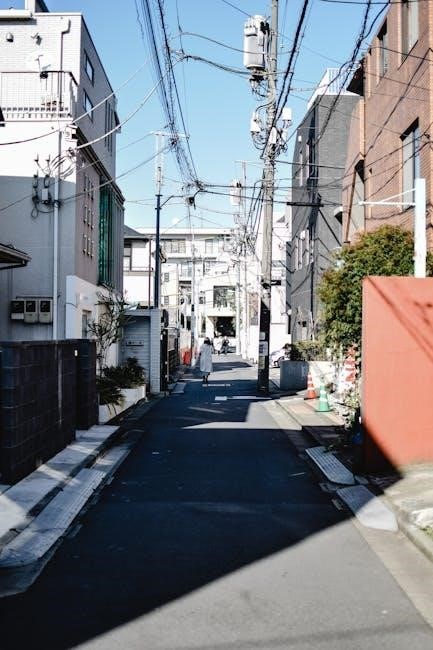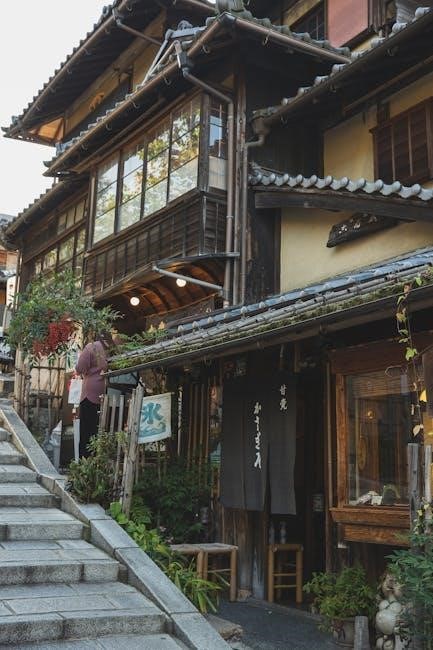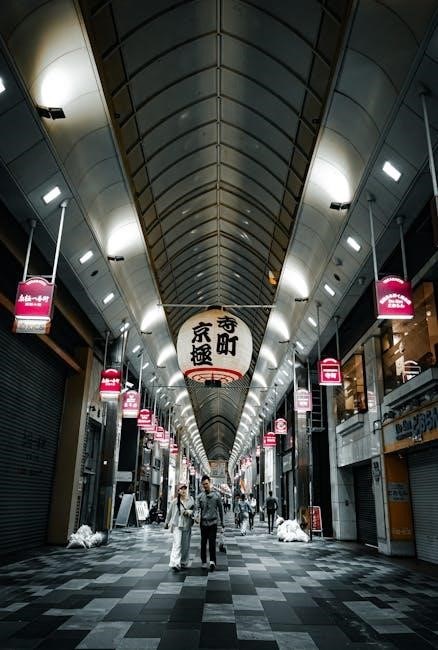Planning a trip to Japan? Learning essential Japanese travel phrases is key to a smooth and enjoyable experience․ Downloadable PDF guides offer handy cheat sheets with key expressions for tourists, ensuring easy communication and enhancing your trip’s enjoyment․ These resources often include audio pronunciations, making it easier to navigate various travel scenarios confidently․ Whether dining, shopping, or asking for directions, these phrases will help you connect with locals and immerse yourself in the culture․ Start your journey with these must-know phrases and make the most of your time in Japan!
Importance of Learning Japanese Travel Phrases
Learning Japanese travel phrases is essential for a seamless and enjoyable experience in Japan․ While many locals in major cities speak some English, understanding basic Japanese phrases can significantly enhance your trip․ Simple expressions like greetings, directions, and food-related terms can help you navigate everyday situations confidently․ Additionally, knowing key phrases demonstrates respect for the culture and can lead to warmer interactions with locals․ Many travelers find that even a little Japanese goes a long way in making their journey more memorable․ With downloadable PDF guides and audio resources widely available, it’s easier than ever to learn these essential phrases․ These resources often include pronunciation tips and common expressions, ensuring you’re well-prepared for various travel scenarios․ By mastering these phrases, you’ll not only overcome language barriers but also deepen your connection with Japan’s vibrant culture and people․

Essential Japanese Travel Phrases
Mastering essential Japanese travel phrases is crucial for navigating Japan․ Common greetings, directions, numbers, and expressions like “arigatou” (thank you) and “sumimasen” (sorry/excuse me) are vital․ Downloadable PDF guides and audio resources provide easy access to these phrases, helping you communicate effectively and confidently during your trip․
3․1 Common Greetings
Mastering common Japanese greetings is essential for respectful and smooth interactions․ Start with “Ohayou gozaimasu” , meaning “Good morning,” used until around noon․ “Konnichiwa” is “Hello,” suitable for midday and afternoon․ In the evening, use “Konbanwa” , meaning “Good evening․” To ask how someone is doing, say “Ogenki desu ka?” (?), which means “How are you?” The response is typically “Genki desu, arigatou” (、), meaning “I’m fine, thank you․” Other essential greetings include “Sumimasen” for “Excuse me” or “Sorry,” and “Arigatou” for “Thank you․” These phrases are fundamental for showing respect and making a good impression in Japan․
3․2 Asking for Directions
Asking for directions in Japan can be straightforward with the right phrases․ Start with “Doko desu ka?” (?), meaning “Where is․․․?” For example, “Toire wa doko desu ka?” (?) asks, “Where is the restroom?” To inquire about locations, use “Ee ki wa doko ni arimasu ka?” (?), meaning “Where is the station?” For directions, say “Kono e ikitai desu” , meaning “I want to go here․” If lost, ask “Chizu o misete kudasai” , or “Please show me a map․” To understand directions, use “Migi ni ikimasu ka?” (?), meaning “Do I go right?” and “Hidari ni ikimasu ka?” (?), meaning “Do I go left?” These phrases will help you navigate confidently in Japan․
3․3 Numbers and Counting
Mastering numbers and counting in Japanese is essential for various travel situations, such as shopping, transportation, and dining․ Start with basic numbers: 1 = ichi, 2 = ni, 3 = san, 4 = yon, 5 = go, 6 = roku, 7 = shichi, 8 = hachi, 9 = kyuu, and 10 = juu․ For higher numbers, combine these, like 20 = ni-juu and 100 = hyaku․ When asking for prices, use “Ikura desu ka?” (How much is this?)․ To request quantities, say “Kono 1-mai o kudasai” (One of these, please)․ Understanding numbers will help you navigate menus, ticket prices, and shopping․ Practice these phrases to enhance your travel experience in Japan!

3․4 Common Expressions

Learning common Japanese expressions will help you interact smoothly with locals․ Start with basic politeness: “Arigatou” (thank you) and “Sumimasen” (excuse me/sorry)․ For greetings, use “Ohayou gozaimasu” (good morning), “Konnichiwa” (hello), and “Konbanwa” (good evening)․ When asking for help, say “Eigo wa hanasemasu ka?” (do you speak English?) or “Muzukashii desu” (it’s difficult)․ Expressing appreciation with “Oishii desu ne” (delicious!) or “Kirei desu ne” (beautiful!) can enhance interactions․ For making requests, use “Onegai shimasu” (please) or “Chotto oishii desu ka?” (is it delicious?)․ These expressions will make your travel experiences more enjoyable and show respect for the culture․ Practice these phrases to communicate effectively during your trip to Japan!
Tips for Pronunciation
Mastering Japanese pronunciation is crucial for effective communication․ Japanese is a syllabic language, making it easier to pronounce once you learn the basics․ Focus on pitch accents, as they can change word meanings․ For example, “hashi” (chopsticks) and “hashi” (bridge) differ only in pitch․ Practice vowels: a, i, u, e, o, as they are pronounced clearly and consistently․ Pay attention to consonants like “r”, which is pronounced softly, almost like a mix of “l” and “d”․ Use online resources or PDF guides with audio to improve your intonation․ Many downloadable phrasebooks include MP3 files to help you mimic native speakers․ Repeat phrases aloud and listen to native speech regularly․ This will help you develop a natural flow and ensure your words are understood․ Proper pronunciation enhances your travel experience and shows respect for the culture․
Dining and Food
Dining in Japan is a cultural experience․ Essential phrases like Sumimasen (excuse me), Ogenki desu ka? (how much is this?), and Kono ryōri o kudasai (I’ll have this dish) enhance your dining experience․ These phrases help navigate menus, request recommendations, and show appreciation for the meal, making your culinary adventures enjoyable and respectful․

5․1 Phrases for Restaurants
When dining in Japan, knowing key restaurant phrases enhances your experience․ Start with greetings like Sumimasen (excuse me) to get attention․ Use Ogenki desu ka? (how much is this?) to ask prices․ For ordering, say Kono ryōri o kudasai (I’ll have this dish)․ To request the bill, use Okanjo kudasai (the check, please)․ Phrases like Chotto oishii desu ne (this is delicious) show appreciation․ Many PDF guides include these phrases with audio, helping you pronounce them correctly․ These expressions ensure smooth communication, making your dining experiences enjoyable and respectful․ Downloadable resources like phrasebooks or PDFs are ideal for quick reference, allowing you to navigate menus confidently․ Learning these phrases enriches your culinary adventures in Japan, helping you connect with staff and locals alike․
5․2 Food Vocabulary
Mastering basic food vocabulary is essential for navigating Japan’s culinary scene․ Common terms like sushi, ramen, and tempura are widely recognized․ Learn to identify ingredients such as gyūniku (beef), tori (chicken), and sakana (fish)․ For vegetarians, phrases like bejitarian desu (I am vegetarian) are helpful․ Knowing terms like gohan (rice) and miso (miso soup) aids in ordering traditional meals․ Many PDF guides include food-related expressions with audio, making pronunciation easier․ These resources often categorize vocabulary by meal types, such as breakfast (asagohan) or dinner (yōgohan)․ Familiarizing yourself with these terms enhances your dining experiences, allowing you to explore Japan’s diverse cuisine confidently․ Downloadable phrasebooks and PDFs are invaluable for quick reference, ensuring you can communicate effectively in restaurants and food stalls․ This vocabulary will enrich your culinary adventures and deepen your appreciation of Japanese culture․

Shopping
Learning essential shopping phrases enhances your retail experience in Japan․ Phrases like “How much is this?” and “Where is the cashier?” are invaluable․ Knowing numbers and polite expressions ensures smooth transactions․ Downloadable PDF guides offer handy shopping vocabulary, making your experience stress-free and enjoyable while exploring Japan’s vibrant markets and stores․
6․1 Basic Shopping Phrases
Mastering basic shopping phrases in Japanese can make your retail experience seamless and enjoyable․ Essential phrases include “Sumimasen” (excuse me) to get assistance and “Kono XX wa ikura desu ka?” (how much is this?) to inquire about prices․ Knowing how to ask for sizes, colors, and availability is also helpful․ Phrases like “Kono aoi no wa arimasu ka?” (do you have this in blue?) or “Chotto mite mo ii desu ka?” (may I see this?) are practical for shoppers․ Additionally, polite expressions like “Ogenki desu ka?” (are you okay?) or “Arigatou gozaimasu” (thank you) are appreciated by shop staff․ Downloadable PDF guides often include these phrases, making them easy to reference while shopping in Japan․ These phrases not only facilitate smooth transactions but also enhance your overall shopping experience in Japan’s vibrant markets and stores․

6․2 Numbers and Prices
Understanding numbers and prices in Japanese is crucial for a hassle-free shopping experience․ Essential phrases include “Kono XX wa ikura desu ka?” (how much is this?) and “XX en desu ka?” (is this XX yen?)․ Knowing basic numbers like 1 (ichi), 2 (ni), 10 (juu), and 100 (hyaku) is vital for understanding prices․ Additionally, phrases like “Kono XX wa doko ni arimasu ka?” (where is this XX?) can help locate items․ For larger amounts, terms like 1,000 (sen) and 10,000 (man) are commonly used․ Many PDF guides provide number charts and audio pronunciations, making it easier to learn and use these phrases․ Mastering these will help you make informed purchases and communicate effectively with shop staff․ These resources ensure you can confidently handle price inquiries and transactions during your shopping adventures in Japan․
Transportation
Mastering Japanese transportation phrases is essential for navigating Japan’s efficient but complex systems․ Key phrases include “Eki wa doko desu ka?” (where is the station?) and “Chikatetsu no chizu o misete kudasai” (show me the subway map)․ For buses, “Basu noriba wa doko desu ka?” (where is the bus stop?) is helpful․ When purchasing tickets, use “Kippu o kudasai” (one ticket, please) and “Ikura desu ka?” (how much is it?)․ For taxis, “XX e tsukete kudasai” (take me to XX) is useful․ Common destinations include kuukou (airport), hoteru (hotel), and eki (station)․ Phrases like “Tsugi no densha wa nanji ni kimasu ka?” (when does the next train come?) and “Tsugi no basu wa nanji ni kimasu ka?” (when does the next bus come?) are invaluable․ Many PDF guides include these phrases with audio, ensuring you can navigate Japan’s transportation network confidently․ Practice these phrases to make your travels seamless and stress-free․
Accommodation
When booking or checking into a hotel in Japan, knowing the right phrases can make the process smoother․ Start with “Hoteru o sagashite imasu” (I’m looking for a hotel) or “Yoyaku wa arimasu ka?” (do you have a reservation?)․ For checking in, use “Chekku-in o onegai shimasu” (check-in, please) and “Kagi o kudasai” (give me the key)․ Common room-related phrases include “Doko ni arimasu ka?” (where is it?) and “Heya wa nan kai desu ka?” (what floor is it on?)․ For special requests, try “Ofuro wa arimasu ka?” (is there a bath?) or “Tawaru o kazoku ni kudasai” (can I have extra towels?)․ Payment phrases like “Kono heya wa ikura desu ka?” (how much is this room?) and “Kādo de haraimasu” (I’ll pay by card) are also useful․ Many PDF guides include these phrases with audio, helping you communicate effectively during your stay․ These expressions will ensure a comfortable and hassle-free experience at your accommodation․

Cultural Phrases
Understanding and using cultural phrases in Japan can deeply enhance your travel experience․ Start with basic respect phrases like “Arigatou” (thank you) and “Sumimasen” (excuse me/sorry)․ When interacting with locals, phrases like “Ogenki desu ka?” (how are you?) and “Ee, genki desu” (I’m fine, thank you) show politeness․ For gratitude, use “Go-kuroosama deshita” (thank you for your hard work) after meals or services․ In temples or shrines, phrases like “Ojigi o shimasu” (I bow) or “Gomen nasai” (sorry) are appropriate․ When receiving something, say “Itadakimasu” before eating and “Gochisousama deshita” after․ These phrases reflect Japan’s emphasis on respect and harmony․ Many PDF guides include cultural expressions with audio, helping you navigate social situations gracefully․ Using these phrases will show appreciation for Japanese customs and make your interactions more meaningful․

Emergency Situations
In case of emergencies, knowing key Japanese phrases can help you act quickly and effectively․ Start with “Kyuujo desu, tasukete kudasai” (It’s an emergency, please help me)․ For medical issues, say “Koko ni eigo o hanasu hito wa imasu ka?” (Is there someone here who speaks English?)․ If you need police assistance, use “Keisatsu o yonde kudasai” (Please call the police)․ For fire emergencies, shout “Kaji da! Tasukete!” (Fire! Help!)․ When asking for directions to a hospital, say “Byouin wa doko desu ka?” (Where is the hospital?)․ Many PDF guides include emergency phrases with audio, ensuring clear communication․ Additionally, knowing numbers like “Hyaku” (100) and “Ni-hyaku” (200) can be useful when providing details․ These phrases are crucial for handling unexpected situations and ensuring your safety while traveling in Japan․ Always carry a phrasebook or digital guide for quick access during emergencies․

Additional Resources
To further enhance your learning, numerous downloadable PDF guides and phrasebooks are available online․ These resources often include audio files for proper pronunciation, making them ideal for travelers․ Websites like Lingua Junkie and bit․ly/travelphrasePDF offer free downloadable guides with essential phrases․ Additionally, platforms like Google Drive and Issuu host a variety of Japanese travel phrasebooks that you can access anytime․ Many of these resources are designed specifically for tourists, covering topics like dining, shopping, and emergency situations․ Some popular options include the “Japanese for Travelers Phrasebook & Dictionary” and the “Survival Japanese PDF”․ These tools are perfect for printing or saving on your device, ensuring you have key phrases at your fingertips during your trip․
Learning essential Japanese travel phrases is a valuable step in preparing for your trip to Japan․ These phrases will not only help you navigate everyday situations but also enhance your cultural experience․ With the abundance of downloadable PDF guides and audio resources available, you can easily access and practice these expressions․ From greetings to emergency situations, having a basic understanding of Japanese will make your journey smoother and more enjoyable․ Don’t hesitate to download these resources and start practicing—your efforts will be appreciated by locals and enrich your time in Japan․ Whether you’re exploring bustling cities or serene landscapes, these phrases will serve as a reliable companion․ Safe travels and enjoy your adventure in Japan!

